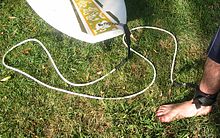leash
Jump to navigation
Jump to search
English
[edit]

Etymology
[edit]From Middle English leesshe, leysche, lesshe, a variant of more original lease, from Middle English lees, leese, leece, lese, from Old French lesse (modern French laisse), from Latin laxa (“thong, a loose cord”), feminine form of laxus (“loose”); compare lax. Doublet of laisse.
Pronunciation
[edit]Noun
[edit]leash (plural leashes)
- A strap, cord or rope with which to restrain an animal, often a dog.
- Synonym: lead
- 1922, F. Scott Fitzgerald, The Beautiful and Damned:
- A stout woman upholstered in velvet, her flabby cheeks too much massaged, swirled by with her poodle straining at its leash
- c. 1608–1609 (date written), William Shakespeare, “The Tragedy of Coriolanus”, in Mr. William Shakespeares Comedies, Histories, & Tragedies […] (First Folio), London: […] Isaac Iaggard, and Ed[ward] Blount, published 1623, →OCLC, [Act I, scene vi]:
- like a fawning greyhound in the leash
- (obsolete) A brace and a half; a tierce.
- (obsolete) A set of three animals (especially greyhounds, foxes, bucks, and hares;)
- (obsolete) A group of three.
- c. 1597 (date written), William Shakespeare, “The First Part of Henry the Fourth, […]”, in Mr. William Shakespeares Comedies, Histories, & Tragedies […] (First Folio), London: […] Isaac Iaggard, and Ed[ward] Blount, published 1623, →OCLC, (please specify the act number in uppercase Roman numerals, and the scene number in lowercase Roman numerals):
- Sirrah, I am sworn brother to a leash of drawers; and can call them all by their Christian names, as, Tom, Dick, and Francis.
- 1609 December (first performance), Beniamin Ionson [i.e., Ben Jonson], “Epicoene, or The Silent Woman. A Comœdie. […]”, in The Workes of Beniamin Ionson (First Folio), London: […] Will[iam] Stansby, published 1616, →OCLC, (please specify the act number in uppercase Roman numerals, and the scene number in lowercase Roman numerals):
- [I] kept my chamber a leash of days.
- 1662 (indicated as 1663), [Samuel Butler], “[The First Part of Hudibras]. Canto I.”, in Hudibras. The First and Second Parts. […], London: […] John Martyn and Henry Herringman, […], published 1678, →OCLC; republished in A[lfred] R[ayney] Waller, editor, Hudibras: Written in the Time of the Late Wars, Cambridge, Cambridgeshire: University Press, 1905, →OCLC:
- It had an odd promiscuous tone, / As if h' had talk'd three parts in one; / Which made some think, when he did gabble, / Th' had heard three labourers of Babel; / Or Cerberus himself pronounce / A leash of languages at once.
- 1874, Alfred Tennyson, “Gareth and Lynette”, in Idylls of the King (The Works of Alfred Tennyson; V), cabinet edition, London: Henry S. King & Co., […], →OCLC, page 39:
- An I could climb and lay my hand upon it, / Then were I wealthier than a leash of kings.
- A string with a loop at the end for lifting warp threads, in a loom.[1]
- (surfing) A leg rope.
- 1980 February, Drew Kampion, “As Years Roll By (1970's Retrospective”, in Surfing, page 43:
- Probably the idea was around before that, but the first photo of the leash in action was published that year
- (prosody) A kind of metrical construct in Skeltonics.
Derived terms
[edit]Translations
[edit]long cord for dogs
| ||||||
a set of three
Verb
[edit]leash (third-person singular simple present leashes, present participle leashing, simple past and past participle leashed)
- To fasten or secure with a leash.
- (figuratively) to curb, restrain
- 1919, Boris Sidis, The Source and Aim of Human Progress:
- Man is brow-beaten, leashed, muzzled, masked, and lashed by boards and councils, by leagues and societies, by church and state.
Antonyms
[edit]- unleash (verb)
Translations
[edit]to fasten or secure with a leash
|
References
[edit]- “leash”, in The Century Dictionary […], New York, N.Y.: The Century Co., 1911, →OCLC.
- “leash”, in OED Online
 , Oxford, Oxfordshire: Oxford University Press, launched 2000.
, Oxford, Oxfordshire: Oxford University Press, launched 2000.
- ^ “leash”, in Webster’s Revised Unabridged Dictionary, Springfield, Mass.: G. & C. Merriam, 1913, →OCLC.
Anagrams
[edit]Categories:
- English terms inherited from Middle English
- English terms derived from Middle English
- English terms derived from Old French
- English terms derived from Latin
- English doublets
- English 1-syllable words
- English terms with IPA pronunciation
- English terms with audio links
- Rhymes:English/iːʃ
- Rhymes:English/iːʃ/1 syllable
- English terms with homophones
- English lemmas
- English nouns
- English countable nouns
- English terms with quotations
- English terms with obsolete senses
- en:Surfing
- en:Prosody
- English verbs